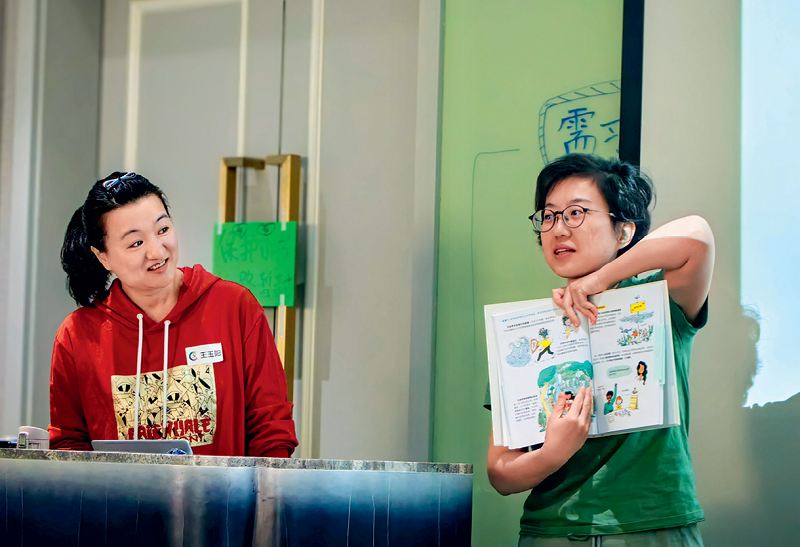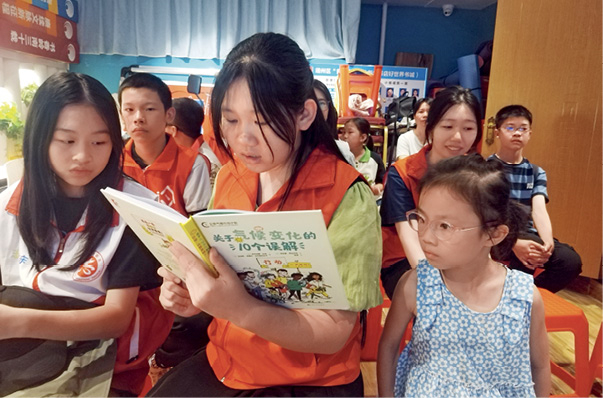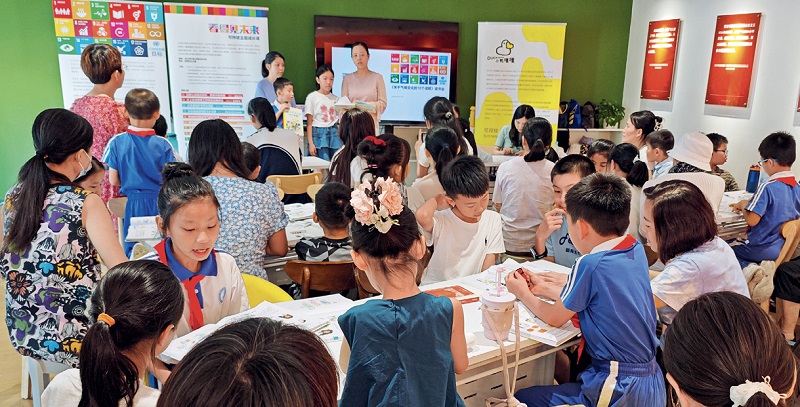A Chinese climate activist is following in the footsteps of two French experts to explain the reasons for and consequences of climate change to young people in a way they find fathomable and interesting.

Zhang Lei (right) introduces the book she has translated to other partners of the Ling-Long project.
There is nothing comic about the fallouts of climate change but comic books are a good way of spreading the message. In 2021, two climate experts working with the French Development Agency published a humorous illustrated book, 10 idées reçues sur le climat (10 misunderstandings about climate change), to bust popular misconceptions about climate change. Today, the book is doing the rounds in China in its Chinese avatar to spread awareness, thanks to a climate activist and an environmental NGO.
Zhang Lei is no keyboard activist. She has been walking the talk for several years. She buys only four garments in a year to cut down on consumption and waste and help reduce carbon emissions. She also did not order takeouts for four years. Now, if necessary, she orders food only from outlets providing paper packaging.
This austere lifestyle is the result of a transformation. Once an avid shopper addicted to ordering takeouts and buying new clothes online, she changed after encountering GoZeroWaste, a community advocating a zero-waste lifestyle and organizing exchange of second-hand goods to encourage recycling.
GoZeroWaste also screens documentaries to drive home how human production and actions are affecting the environment. A film about fashion consumption left a deep impression on Zhang. It tells the story of a journalist investigating the origin of jeans and their impact on the environment. He discovers that the fourth largest lake in the world – Aral Sea in Central Asia – has shrunk due to the diversion of its water for irrigation in cotton production.
“The place has metamorphosed from a fertile land to a dry area, and the survival of the local people cannot be sustained,” Zhang told China Today. “From then on, I began to think about environmental protection and I thought I should also take some action.”
Zhang began to pay attention to environmental issues. In her personal life, she sought to reduce the waste she generated and the frequency of buying clothes. She says she freed herself from the trend of catching up with the prevailing fashion to improve her appearance by embracing a new lifestyle.

Teenagers participate in a reading activity in Zhaoqing City, Guangdong Province, on May 26, 2024.
In April 2021, Zhang took part in a Climate Fresk workshop for the first time. Climate Fresk is a climate-themed board game developed by French engineer Cédric Ringenbach based on charts and reports by the Intergovernmental Panel on Climate Change (IPCC). Led by a facilitator, players from different groups place the cards in order on the board, find all the cause-and-effect relationships, and learn the mechanisms and consequences of climate change.
As Zhang began to study climate change issues intensively, she came across 10 idées reçues sur le climat. The book, based on IPCC reports and orther research, delved into complex climate issues with humorous dialogues.
Zhang said it was exactly the kind of climate change education people need.
Their book, easy to read and attractively illustrated, explains a seemingly distant and irrelevant topic clearly. It eliminates the preconceived ideas about climate change that are popular on social media so that more people can understand what is happening and encourages everyone to take action. “At the end of the Climate Fresk workshop, everyone was urged to take action. So, I thought I can translate the book (into Mandarin) as my climate action.”
She received some unexpected help with her ambition. Friends of Nature (FON), one of the oldest environment NGOs in China, had launched their Ling-Long Project to support Chinese citizens in climate action. At the third phase of the project, Zhang was one of the lucky ones chosen from 223 applicants and given RMB 11,900 in funding to translate the French popular science comic.
But despite the leg-up, the mission was fraught with challenges. The children’s book market is dominated by storybooks while teenagers tend to buy books that will help them with their school curriculum. Besides, the climate-themed books in the market are highly specialized and it was uncertain if a climate comic would get any response.
The process of translation itself was also difficult. Zhang had to be familiar with technical terms and verify the data. To acquire specialized knowledge, she joined an education program organized by FON and on weekends, studied under renowned climate experts to build a systematic knowledge framework. Besides the original text, she also consulted other Chinese, English, and French materials, started corresponding with the French authors, and discussed the nuances of the Chinese expressions with domestic experts. After rounds of revisions and reviews, the book was published in April 2024.
It has received many positive comments. Chen Ying, deputy director of the Sustainable Development Research Center of the Chinese Academy of Social Sciences, who wrote the preface to Zhang’s translation, called it a rare and good science popularization book on climate change. Many netizens said they have acquired a lot of scientific knowledge and action suggestions through the “vivid and accessible” book and were willing to try out practical actions to reduce carbon emissions in their daily lives.

Students read Zhang Lei's book at the Shenzhen Baoan Middle School (Group) on July 14, 2024. Photos courtesy of Zhang Lei
To persuade more people to take action, Zhang also launched a “leader reader” program. The lead readers need to organize at least one book club in their own community to explain climate change and its repercussions to the audience, and provide feedback in the form of text, images, or videos.
Sponsored by FON, Zhang has recruited 100 lead readers, including teachers, coffee shop owners, librarians, business representatives, and social workers.
Among the feedback, Zhang was very happy to see that a drama teacher led her young students to enact the dialogues in the book. In megacity Shenzhen in south
China, high school teachers integrated Zhang’s book in their daily lessons. In a library in Xiamen, also in south China, children, inspired by Zhang’s book, expressed their views of nature through art and craft.
When she was a child, a river that ran through her hometown was her playground. She would take a bucket there and play in the clear water that was home to innumerable living beings. Then came the development of industries that brought many conveniences to people’s lives but also distanced them from nature. Making nature a part of people’s lives again requires everyone’s efforts.
In the future, Zhang hopes to compile more popular science books on ecological issues. She hopes such books will enable more people to learn about hot-button issues and participate in actions to address climate change. At present, she is working on a book on forest and ocean conservation. “Books are a special commodity. I wish they can achieve a win-win situation of commercial value and social benefits,” she said. “I hope readers will connect human activities with climate change, and this book is a beginning.” 
